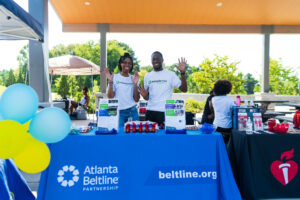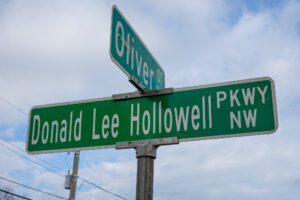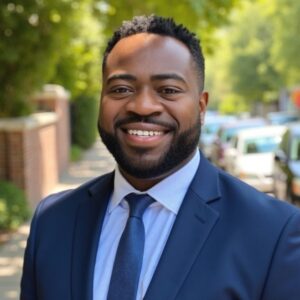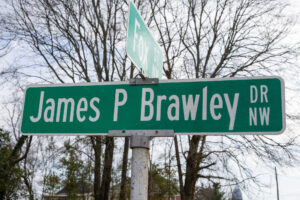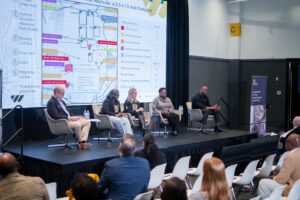In 2019, Food Well Alliance and Westside Future Fund partnered to purchase and revitalize 970 Jefferson St. NW, the historic site of the Atlanta Community Food Bank. Bill Bolling and John Ahmann played pivotal roles in making this acquisition a reality, turning a shared vision into a success. The two organizations collaborate on managing the facility, with Food Well Alliance overseeing the warehouse and upstairs space, while Westside Future Fund is responsible for maintaining the rest of the building.
Today, 19 nonprofits and local enterprises utilize 970 Jefferson, operating from this revitalized space to collectively contribute to the betterment of the Westside community and beyond, embodying the shared vision that inspired the partnership. We’ve launched a new series, the 970 Partner Spotlight, to highlight each of these incredible organizations and their work. This issue features the Atlanta Beltline Partnership, a nonprofit dedicated to philanthropic fundraising, donor-supported programming, and advocacy to support the Beltline’s vision for making Atlanta a global beacon for equitable, inclusive, and sustainable city life.
A Vision for Connectivity and Inclusion
From its inception, the Atlanta Beltline has been more than a transit, trail, and greenspace project — it is a movement to unify Atlanta’s communities. Initially conceived by Ryan Gravel as a way to repurpose abandoned rail corridors, the Beltline has since become a transformative force, driving economic development, expanding access to greenspace, and fostering equitable growth across 45 neighborhoods.
Michael Davis, Deputy Executive Director of the Atlanta Beltline Partnership, emphasized the organization’s commitment to inclusivity.
“The Beltline has always been about access and opportunity. It’s about bringing communities together, protecting legacy residents, and ensuring that all Atlantans — especially those on the Westside — can benefit from this city-changing investment.”
Supporting Legacy Residents and Small Businesses
As investment in the Beltline corridor has increased, the Partnership has remained steadfast in its focus on affordability and anti-displacement efforts. A key initiative is the Legacy Resident Retention Program (LRRP). Funded through philanthropic donations, the program provides direct financial assistance to longtime homeowners to help them stay in their homes and build wealth as property values rise.
“Since launching the program four years ago, LRRP homeowners who have been in the program for at least a year have seen their homes appreciate nearly $50,000 on average. Based on the appraised property value in the Fulton County tax records, the home values for the 250 program participants have appreciated by a combined $10.8 million, calculated from the time each participant joined the program. We’re working to make sure that growth benefits the people who built these communities, not just new investors,” Davis explained.
In addition to the Legacy Resident Retention Program, the Atlanta Beltline Partnership offers valuable workshops and webinars for both renters and homeowners, funded through philanthropic donations. These workshops provide essential tools and resources to help residents save on taxes, stay in their homes, and secure their financial future. In 2024, over 600 participants attended these workshops. Homeowners who participated in the property tax appeal workshop experienced an average reduction of $30,000 in their property tax appraisals following their Board of Equalization hearings.
Beyond housing, the Beltline is a catalyst for small business growth, particularly for minority- and women-owned businesses. The Atlanta Beltline Partnership provides philanthropic support for the Atlanta Beltline Marketplace. Managed by Atlanta Beltline, Inc. (the agency responsible for Beltline implementation), this initiative creates commercial affordability solutions across four marketplace locations adjacent to the Southside, Westside, and Eastside.
“For just a couple hundred dollars a month, entrepreneurs gain access to prime foot traffic and business wraparound services to help them scale,” Davis said. “It’s about creating pathways for economic mobility.”
Strengthening the Westside Through Collaboration
Since moving to 970 Jefferson, the Beltline Partnership has been able to deepen its work in Westside neighborhoods, an area historically affected by disinvestment and displacement.
“Our office location puts us at the heart of the communities we serve,” Davis noted. “The collaboration with fellow nonprofits at 970 Jefferson allows us to be more responsive and innovative in tackling challenges like housing affordability, workforce development, and healthy living.”
The Partnership is particularly excited about expanding its health and wellness programs on the Westside. With initiatives like Walk with a Doc in Cook Park in Historic Vine City next to the Westside Beltline Connector and health fairs connecting residents to critical services, the organization is promoting healthier lifestyles and community well-being.
Looking Ahead: Major Investments in Westside Parks and Trails
Exciting park developments are on the horizon for the Westside thanks to donations to the Beltline Partnership from more than 20 donors for two new and expanded greenspaces. Construction will soon begin on Enota Park, an eight-acre park near Westview, addressing a long-standing lack of recreational space in the area. With amenities like walking trails, a splash pad, a playground, a half-court basketball court, a multi-use field, and more, the park is set to become a new destination for families and community gatherings.
Another landmark project is a world-class bike park at Shirley Clarke Franklin Park (formerly Westside Park). Designed to be one of the most inclusive bike facilities in the country, the park will feature areas for all skill levels, including sections that are accessible to individuals with disabilities. The Beltline Partnership is continuing to raise funds so construction can begin in late 2025.
Meanwhile, as Atlanta prepares for the 2026 FIFA World Cup, 17.9 miles of continuous Atlanta Beltline paved trail will be delivered, creating the longest continuous stretch of mainline trail. The acceleration of the Southside Trail construction ensures all segments are complete and link Eastside and Westside Trails. The Westside Trail – Segment 4, will close the gap between Washington Park and the Westside Beltline Connector Trail in Bankhead, and Northwest Trail – Segment 5, will extend the Beltline north of the intersection of Marietta Boulevard and Huff Road to Ellsworth Industrial and English Street in Blandtown.
“The Robert W. Woodruff Foundation and The James M. Cox Foundation made historic donations through the Beltline Partnership to invest alongside substantial public funding to complete the full 22-mile Beltline trail corridor by 2030. We’ll have nearly 18 miles of contiguous Beltline trail in the spring of 2026, which will make the Westside Trail more accessible than ever,” Davis said.
The Power of Place at 970 Jefferson
For the Atlanta Beltline Partnership, being based at 970 Jefferson is about being part of a collaborative ecosystem working to shape the future of Atlanta.
“This building has a rich history of community service, and it continues to be a hub for positive change,” Davis reflected. “The partnerships we’ve built here are strengthening our ability to serve Atlanta’s residents, ensuring that as the city grows, no one is left behind.”
Learn more about the Atlanta Beltline Partnership and the work happening at 970 Jefferson at 970Jefferson.org.


